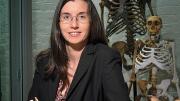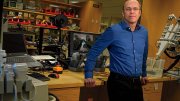“Teeth have rhythms inside them that are very precise, regular, and consistent, like rings in tree trunks,” says Tanya Smith, associate professor of human evolutionary biology. “And like tree rings, they can show you how long the organism has been growing—but on an even finer scale. Children’s teeth lay down a mineralized record of growth every day. Your entire childhood is recorded in your teeth.” The same holds for other primates. Thus Smith, using light microscopy, once examined a tooth section from a wild chimpanzee that died of Ebola in the early 1990s. After locating the “birth line,” the birth process inscribed in teeth, she determined the chimp had lived 1,396 days; field notes showed she was off by only 24 days. Smith learned microscopy at SUNY Geneseo as a biology concentrator who also studied biological anthropology, earning her B.S. in 1997; her Ph.D. in anthropological sciences came in 2004 from SUNY Stony Brook. She then spent several years at the Max Planck Institute for Evolutionary Anthropology in Leipzig, arriving at Harvard in 2008. The ability to attribute precise ages to juveniles, even those from the early Pleistocene, can shed light, she says, on evolutionary riddles like the origin of the very long childhood, relatively late age at reproduction, and lengthy lifespan of human beings. Primates that grow and erupt teeth earlier also reproduce sooner and live shorter lives. “Earlier hominins like Neanderthals seem to have had faster dental development,” she notes, “implying more accelerated overall growth and development than our species.” Away from the lab, Smith is an avid kayaker who enjoys field research like studying apes, monkeys, and lemurs in their natural habitats: “I love being out in the wild.”
Tanya Smith, Harvard Professor, studies teeth and how to date them
Tanya Smith, Harvard Professor, studies teeth and how to date them
Tanya Smith is a biological anthropologist who uses scientific methods to study human and primate teeth.

You might also like
Are “Little Red Dots” Keys to Understanding the Early Universe?
Harvard-Smithsonian astrophysicist Fabio Pacucci explains one of cosmology’s newest mysteries
Research in Brief
Cutting-edge discoveries, distilled
Bees and Flowers Are Falling Out of Sync
Scientists are revisiting an old way of thinking about extinction.
Most popular
Explore More From Current Issue

At Harvard’s Beck-Warren House, Ghosts Speak Many Languages
The quirky 1833 home now hosts Celtic scholars.

Inside Harvard’s Most Egalitarian School
The Extension School is open to everyone. Expect to work—hard.






